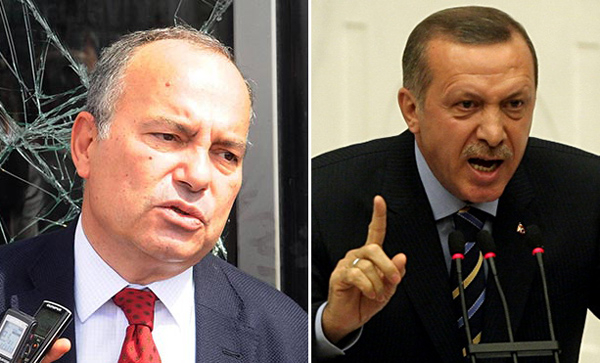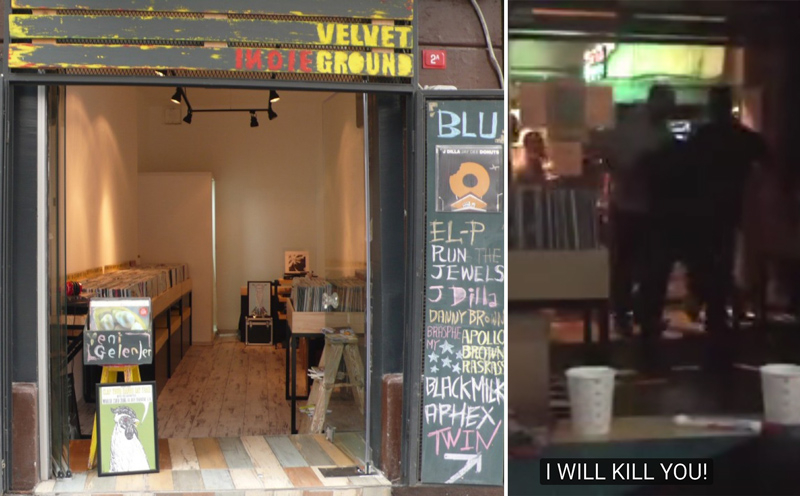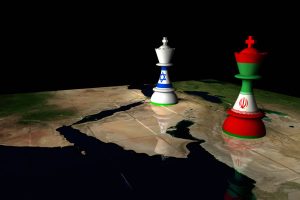Since late February, locals from the predominantly-Alevi populated villages in the province of Kahramanmaras, or Maras, have been protesting government plans to build a “container city” (housing made from used shipping containers) in their villages supposedly for the Syrian “refugees.”
There are 16 Alevi villages in the region where the container city for “27,000 refugees” is being built by the Prime Ministry’s Disaster and Emergency Management Authority (AFAD).
The villagers are deeply concerned that militants might infiltrate, and that the container city “could be turned into a human resources department of jihadists such as ISIS and al-Nusra.”
The Alevis in Turkey are a persecuted religious minority who have been exposed to several massacres and deadly attacks — in both the Ottoman Empire and the Republic of Turkey.
The Alevis in Maras say that they are afraid of being exposed to yet another massacre or forced displacement — this time at the hands of foreign jihadists.
When the plans for building a container city for Syrians first came up, the Alevis sought help from the governor. When their complaints were mostly met with silence or indifference, the villagers started peaceful protests in which they set up tents and read statements to the press to express their opposition to the camp being built.
On April 3, however, the gendarmerie forces attacked the villagers with water cannons and tear gas, and detained six people.
Affected by the police’s tear gas, Mor Ali Kabayel, 82, was taken to hospital, where he died.

Turkish gendarmerie forces attack Alevi villagers with tear gas near Maras, April 3, 2016. |
According to the journalist Gulsen Iseri, the villagers are “scared of being exposed to a new 1915 [genocide] in which Armenians were deported.”
Hasan Huseyin Degirmenci, an Alevi from Maras, said:
“The real project here is to carry out another 1915. Just like Armenians were deported from here, they want to deport us in the same way. I lived through 1978 Maras [massacre]. I was 24 years old back then. I had to go abroad afterwards.”
As for the container camp and the 27,000 potential newcomers, Degirmenci said:
“The camp that is being built is 360 square meters. They say it will be all-inclusive. But it will not be able to take 27,000 people. Those people will disperse to villages and cities. The local people here will then have to leave behind their homes and become refugees elsewhere. We are scared of living through another 1915. Of course, we are uneasy.”
In protest, Alevis have staged demonstrations across Turkey and Europe.
On April 10, when hundreds of Alevis in Ankara wanted to march protesting the container city in Maras, the police attacked them with plastic bullets, tear gas and water cannons, and detained 10 people. [1]
“We are not against refugees,” said Salman Akdeniz, the head of the Maras branch of the Pir Sultan Abdal Alevi Cultural Association. “We have no problem with the oppressed peoples that have been persecuted in the war and forcibly displaced from their lands. Alevi Kurds in these lands know very well what it means to be a refugee. We have become refugees in other countries for years. We just think this choice of a place is wrong.”
A researcher, Turan Eser, told the newspaper Birgun that,
“there will be some dire consequences for the establishment of the camps in Maras. The demographic character of the region will be changed. The publicly-owned, fertile lands will be destroyed. Damage to the co-existence of Alevis could pave the way to forced emigration [of Alevis]. There are also assessments that industrial enterprises will use those in refugee camps as cheap labor.
“The reports about what is going on inside refugee camps in Turkey have also jogged people’s memories. That there are Salafis or families of ISIS members as well as the cadres of the [Syrian] Train and Equip Program in those camps and that the ID cards of AFAD [the Prime Ministry’s Disaster and Emergency Management Authority] have been given to ISIS members steer people’s perceptions of the camps to different directions. Naturally, people get uneasy when AFAD camps are mentioned.”
Syrian refugees will also be settled in Alevi villages in the province of Sivas. The district governors in the city have reportedly asked the local authorities in those villages to provide them with the list of the empty houses in the villages as well as with the winter and summer populations there.
“This is a policy of forcing Alevis to immigration and dissolving the Alevi population,” Gani Kaplan, the head of the Pir Sultan Abdal Alevi Cultural Association, told the Dicle News Agency (DIHA). “We are not against immigrants, but it is impossible for us to live alongside jihadists in the same village.”
Kaplan added that in the 1980s, Afghans were settled in the Alevi villages in the province of Tokat. “Today there is not an Alevi population there. The state policy towards Alevis does not change.”
The province of Sivas is also a terrible choice by the government to build another container city for “refugees”: Alevis in Sivas were already exposed to a deadly attack there at the hands of Islamists in 1993.[2]
Zeynep Altiok, an MP from the Republican People’s Party (CHP), whose father lost his life in the Sivas massacre in 1993, asked in a parliamentary motion to Prime Minister Ahmet Davutoglu:
“After the attempt to build a refugee camp in the middle of the Alevi villages… — where the [1978] massacre happened — is it a coincidence that you are building yet another refugee camp in the predominantly Alevi town of Divrigi in Sivas — where the [1993] massacre… took place? What is the objective of all of that?”
“The immigration of Syrian refugees whose population is almost 10 times higher than the Alevi community in those villages,” Altiok noted, “especially after the reports about the camps and about what is going on in those camps came out — is extremely disturbing for the Alevis.”
Unfortunately, the government has not taken any steps to relieve the tension in the region or eliminate the fears of Alevis. So the protests continue, as well as establishing the camps.
Alevis are the second largest religious community in Turkey, although no official statistics are available.
Though systematically denied by the Turkish regime, the Alevi faith is a genuine and distinct religious faith. The state tries to portray the Alevi faith as just an Islamic sect or an interpretation of Islam, but objective scholars, as well as Alevis who have the courage to challenge the state official ideology, contradict that:
“Islam has a dynamic based on conquest and booty,” wrote the sociologist Ismail Besikci.
“A country is conquered; its people are invited to Islam; if they do not accept Islam, their women, children, and properties all become booty. The properties of those who accept Islam are also seized. They are only able to escape death. Are these things existent in Alevism? Does Alevism require conquering here and there, inviting people to the Alevi faith, murdering those who do not accept the faith, and plundering their properties, women and children?”
Alevism places love for the whole of humanity, peaceful coexistence and reason in its center, so such crimes in Alevism do not exist. Alevis also reject ethnic and religious discrimination.
“Salah [Islamic prayer], fasting [during the month of Ramadan], hajj [Islamic pilgrimage to Mecca], zakat [Islamic religious tax], and shadada [Islamic declaration of faith] are the basic forms of worship in Islam. There are no such rules in Alevi worship,” Besikci noted as well.
Kemal Bulbul, the former President of the Pir Sultan Abdal Alevi Cultural Association, also emphasizes that Alevism is a faith in its own right:
“Alevi faith has been influenced by Islam but Alevism is Alevism. And Alevism respects all other faiths.
“The religious centre of Sunnism is the mosque. They carry out the requirements of the Sunni faith and do salat (Islamic prayer, five times a day) at mosques. The centre of Alevism is the cem house. They carry out [the religious ritual called] cem. This is where the difference between the two begins. Their religious rituals are completely different.
“Alevism is not ‘Anatolian Islam’. To call Alevism as such is the Turkish-Islamic view of the state.” ‘Anatolian Islam’ is a perspective that the official ideology of the state tries to promote.
“If Alevis were ‘Anatolian Muslims’, why have Alevis been denied in this country? If Alevism is ‘Anatolian Islam’, why have those who call themselves Muslims opposed this faith, its practice of cem and its cem houses? That is a heavy contradiction.”
Apparently, carrying out massacres is just one way the Turkish state uses to exterminate the Alevis. For when you deny Alevism, there is no need officially to recognize Alevis in your constitution, build cem houses for them or prepare school courses where Alevism is also taught extensively. The denial of the faith seems to be an effective way of assimilating Alevis into the Islamic culture or making them “invisible.”
There are also other methods — such as trying to change the demographic character of the predominantly Alevi places by building container cities in the middle of Alevi villages, especially where the locals have already been exposed to appalling mass killings and social pressures.
Alevis have justifiable reasons for opposing these container cities. They, as everyone else, already see the growing jihadist presence in Turkey. And they have seen as well that forced displacements and deportations of non-Muslim communities have always been common practices in Turkey: If you can’t kill them all off outright, terrorize them to the point that they will eventually have to flee for their lives.
Uzay Bulut is a Turkish journalist born and raised as a Muslim in Turkey. She is presently based in Washington D.C.
[1] Maras, where the “refugee camps” are being built, was the scene of a massacre by radical Muslims and Turkish nationalists in 1978. In a series of attacks in December, 1978 in Maras that lasted a week, 111 people were killed and hundreds more wounded. The victims were mostly Alevi Kurds.
The author Aziz Tunc who wrote a book on the massacre said that on the day of the attack, members of the Turkish Nationalist Movement Party (MHP) incited people to violence by making it a religious war.
“They shouted slogans like ‘today is the day of jihad’, ‘if you kill an Alevi, you will go to heaven’, ‘today is the last day of Alevis’ and ‘there is a Kurdish wedding today’. By ‘Kurdish wedding’, they meant a Kurdish massacre,” Tunc said.
“After those announcements, the fascists started a massacre that is too hard to verbalize,” said Kemal Bulbul, the former President of the Pir Sultan Abdal Alevi Cultural Association. “They burned people to death, cut them to pieces and slaughtered even children, elderly people and pregnant women.”
The massacre scared many people who packed up and left their homes forever and settled elsewhere in Turkey or Europe.
(More about the 1978 Maras massacre, please read: “Deadly 1978 Maras Attack Still Fresh in Minds of Survivors“, By Uzay Bulut, Rudaw, December 29, 2013.)
[2] On July 2, 1993, a group of Islamic fundamentalists surrounded the Madimak Hotel in which many intellectuals were staying for the Pir Sultan Abdal Festival.
The novelist Aziz Nesin, who had got Salman Rushdie’s book The Satanic Verses translated and published and who criticized Islam, was one of the participants of the event. The demonstrations to protest his appearance turned violent; the fundamentalist crowd set fire to the Madimak Hotel.
Nesin was able to escape, but 33 others, mostly intellectuals and Alevis, who stayed inside the hotel, were murdered. Security forces and state officials did not stop the massacre on time.
(More about the massacre: “2 July 1993: How Turkish Islamists Publicly Massacred Alevi Intellectuals“, by Uzay Bulut, Jerusalem Online, July 30, 2015)





































